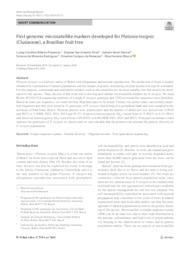First genomic microsatellite markers developed for Platonia insignis (Clusiaceae), a Brazilian fruit tree.
First genomic microsatellite markers developed for Platonia insignis (Clusiaceae), a Brazilian fruit tree.
Summary: Platonia insignis is a fruit tree native of Brazil with allogamous and asexual reproduction. The production of fruits is mainly obtained by exploitation of natural populations and the impact of genetic structuring on plant production may be evaluated. For this purpose, codominant and multiallelic markers such as microsatellite are the most suitable, but they need to be developed for this species. Thus, the aim of this work was to develop and validate microsatellite markers for P. insignis. We used Roche 454 GS FLX sequencing platform of a single P. insignis genotype and 1702 microsatellite sequences were identified. Based on some pre-requisites, we could develop 50 primer pairs to be tested. Twenty-two primer pairs successfully amplified fragments and they were tested in 31 genotypes of P. insignis that belong to a germplasm bank and were sampled in the northeast of Pará State, Brazil. Thirteen primers were polymorphic and the number of alleles per loci varied from 5 (PI18 and PI27) to 2 (PI08, PI25, PI31, PI33 and PI 37). Expected heterozygosity (HE) varied from 0.74 (PI27) to 0.12 (PI31)b and observed heterozygosity (HO) varied from 1.00 (PI25) to 0.00 (PI08, PI31, PI33 and PI37). Principal coordinates could separate the genotypes of P. insignis in clusters and we can conclude that the primers can estimate the genetic diversity of P. insignis populations.
Publication year: 2020
Types of publication: Journal article
Unit: Embrapa Eastern Amazon
Observation
Some of Embrapa's publications are published as ePub files. To read them, use or download one of the following free software options to your computer or mobile device. Android: Google Play Books; IOS: iBooks; Windows and Linux: Calibre.
Access other publications
Access the Agricultural Research Database (BDPA) to consult Embrapa's full library collection and records.
Visit Embrapa Bookstore to purchase books and other publications sold by Embrapa.

